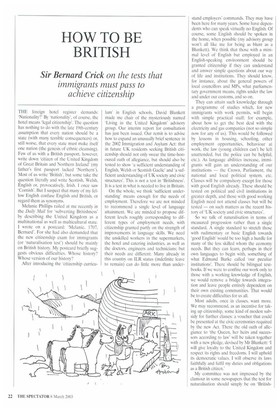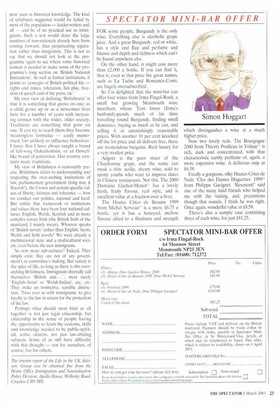HOW TO BE BRITISH
Sir Bernard Crick on the tests that
immigrants must pass to achieve citizenship
THE foreign hotel register demands: 'Nationality?' By 'nationality', of course, the hotel means 'legal citizenship'. The question has nothing to do with the late 19th-century assumption that every nation should be a state (with many terrible consequences) or, still worse, that every state must make itself one nation (the genesis of ethnic cleansing). Few of us with a British passport, however, write down 'citizen of the United Kingdom of Great Britain and Northern Ireland' (my father's first passport lacked `Northern'). Most of us write 'British', but some take the question literally and write Scottish, Welsh, English or, provocatively. Irish. I once saw 'Cornish'. But I suspect that many of my fellow English confuse English and British, or regard them as synonyms.
Melanie Phillips railed at me recently in the Daily Mail for 'subverting Britishness' by describing the United Kingdom as a multinational as well as multicultural state. I wrote on a postcard: 'Melanie. 1707, Bernard'. For she had also demanded that the new citizenship exam for immigrants (or 'naturalisation test') should he mainly on British history. My postcard briefly suggests obvious difficulties. Whose history? Whose version of our history?
After introducing the 'citizenship curricu lum' in English schools, David Blunkett made me chair of the mysteriously named 'Living in the United Kingdom' advisory group. Our interim report for consultation has just been issued. Our remit is to advise how to expand an unusually brief sentence in the 2002 Immigration and Asylum Act: that in future UK residents seeking British citizenship should not only swear the time-honoured oath of allegiance, but should also be tested to show 'a sufficient understanding of English, Welsh or Scottish Gaelic' and 'a sufficient understanding of UK society and civic structures'. This is not a test in 'Britishness'. It is a test in what is needed to live in Britain.
On the whole, we think 'sufficient understanding' means enough for the needs of employment. Therefore we are not minded to recommend a single level of language attainment. We are minded to propose different levels roughly corresponding to different types of employment needs, with citizenship granted partly on the strength of improvements in language skills. We need the unskilled workers in the supermarkets, the hotel and catering industries, as well as the doctors, engineers and technicians: but their needs are different. Many already in this country on ILR status (indefinite leave to remain) can do little more than under stand employers' commands. They may have been here for many years. Some have dependents who can speak virtually no English. Of course, some English should be spoken in the home, when possible (my advisory group won't all like me for being as blunt as a Blunkett). We think that those with a minimal level of English but employed in an English-speaking environment should be granted citizenship if they can understand and answer simple questions about our way of life and institutions. They should know, for instance, about the general powers of local councillors and MPs, what parliamentary government means, rights under the law and under our customs, and so on.
They can attain such knowledge through a programme of studies which, for new immigrants with work permits, will begin with simple practical stuff: for example, about how to get the best deal with the electricity and gas companies (not so simple now for any of us). This would be followed by lessons in housing, schooling, other employment opportunities, behaviour at work, the law (young children can't be left unattended, but the police can be helpful, etc.). As language abilities increase, immigrants will gain an understanding of our institutions — the Crown, Parliament, the national and local political system. etc. Classes will be compulsory except for those with good English already. These should be tested on political and civil institutions in greater depth, and those with good working English need not attend classes but will he tested — on such matters as the recent history of `UK society and civic structures'.
So we talk of naturalisation in terms of measured progression rather than a single standard. A single standard to stretch those with rudimentary or basic English towards 'good English' would be too high a hurdle for many of the less skilled whom the economy needs. But they can learn, perhaps in their own languages to begin with, something of what Edmund Burke called 'our peculiar institutions'. There should be bilingual textbooks. If we were to confine our work only to those with a working knowledge of English, we would remove a bridge towards integration and leave people entirely dependent on their own existing communities. That would be to create difficulties for us all.
Most adults, once in classes, want more. We may recommend, as an incentive for taking up citizenship, some kind of modest subsidy for further classes: a voucher that could be presented at the civic ceremonies required by the new Act. There the old oath of allegiance to 'the Queen, her heirs and successors according to law' will be taken together with a new pledge, devised by Mr Blunkett: 'I will give loyalty to the United Kingdom and respect its rights and freedoms. I will uphold its democratic values. I will observe its laws faithfully and fulfil my duties and obligations as a British citizen.'
My committee was not impressed by the clamour in some newspapers that the test for naturalisation should simply be on 'British ness' seen as historical knowledge. The kind of syllabuses suggested would be failed by most of the population — leader-writers and all — and be of no practical use to immigrants. Such a test would deter the large numbers of non-nationals already here from corning forward, thus perpetuating separation rather than integration. This is not to say that we should not look at the programme again to see where some historical context is needed to make sense of the programme's long section on 'British National Institutions'. As well as formal institutions, it points to 'concepts of British political life — rights and duties, toleration, fair play, freedom of speech and of the press, etc.'
My own view of defining 'Britishness' is that it is something that grows on one: as a child grows up or as a newcomer lives here for a number of years with increasing contact with the wider, older society. Traditions are something that grow on one. If you try to teach them they become meaningless formulae — easily memorised, but unlikely to influence behaviour. I fancy that I have always taught a brand of left-wing Oakeshottism, or an Orwelllike brand of patriotism. Our country contains many traditions.
My view of Britishness is reasonably precise. Britishness refers to understanding and respecting the over-arching institutions of law, parliamentary government (long may it flourish!), the Crown and certain specific values of liberty, fairness and tolerance — how we conduct our politics, national and local. But within that framework of institutions and values there have been four national cultures: English, Welsh, Scottish and in more complex senses Irish (the British Irish of the mainland, I mainly mean). Whoever speaks of 'British novels' rather than English, Scots, Welsh and Irish novels? We were already a multinational state and a multicultural society, even before the new immigrants.
So now more sub-cultures? Indeed. They simply exist: they are not of any government's or committee's making. But variety is the spice of life, so long as there is this overarching Britishness. Immigrants shrewdly call themselves 'British and. . ', most rarely 'English-Asian' or 'Welsh-Indian', etc., etc. They make an instinctive, sensible distinction. 'Twas ever so with immigrants: to give loyalty to the law in return for the protection of the law.
Perhaps what should most bind us all together is not just legal citizenship, but citizenship in the sense of people having the opportunity to learn the customs, skills and knowledge needed to be public-spirit
ed, active citizens, not just law-abiding subjects. Some of us still have difficulty with this thought — not for ourselves, of CCIIITSC, but for others.
The interim report of the Life in the UK Advisory Group can be obtained free from the Home Office Immigration and Naturalisation Policy Division, Apollo House, Wellesley Road, Croydon CR9 3BY.



































































 Previous page
Previous page